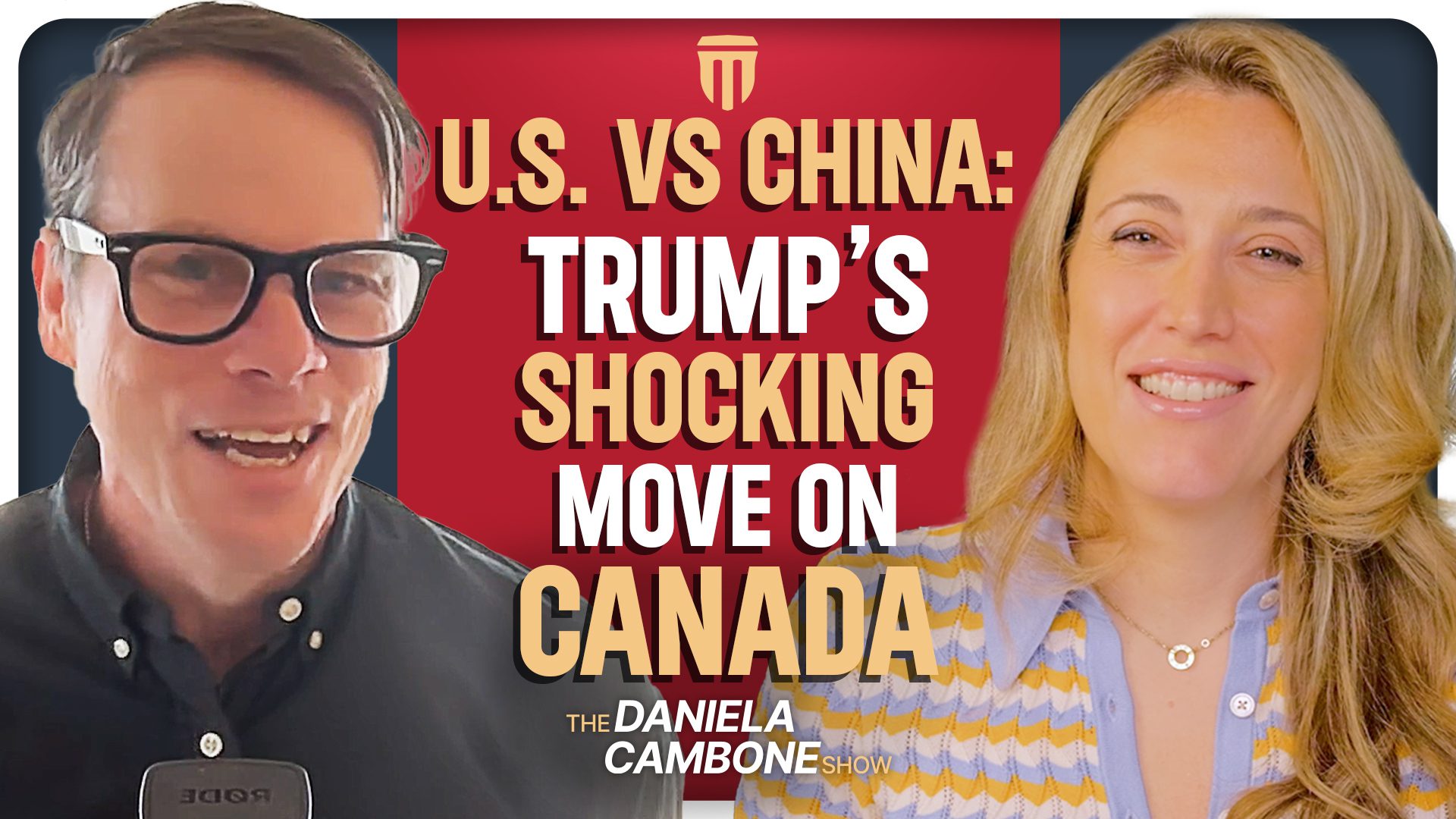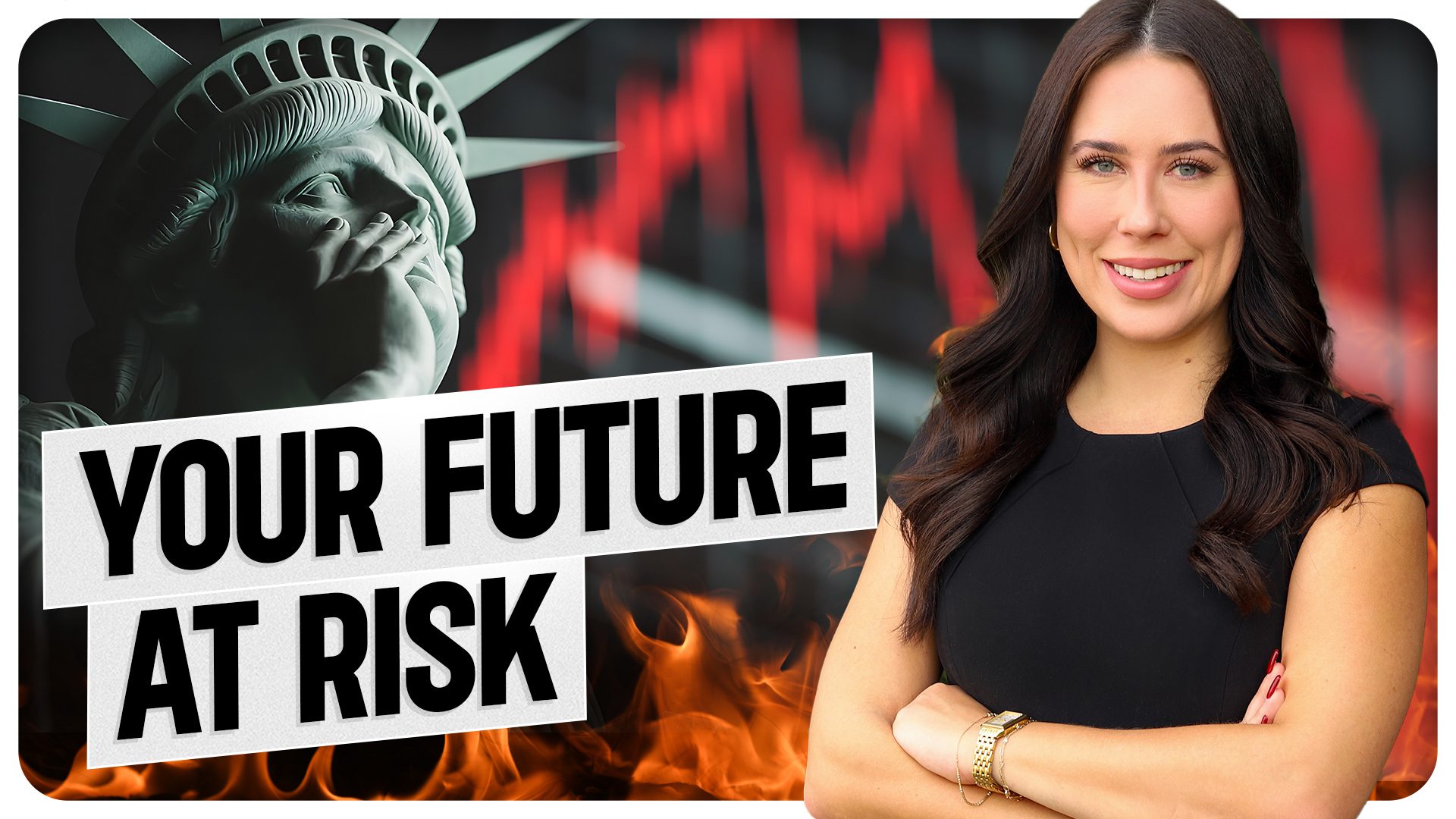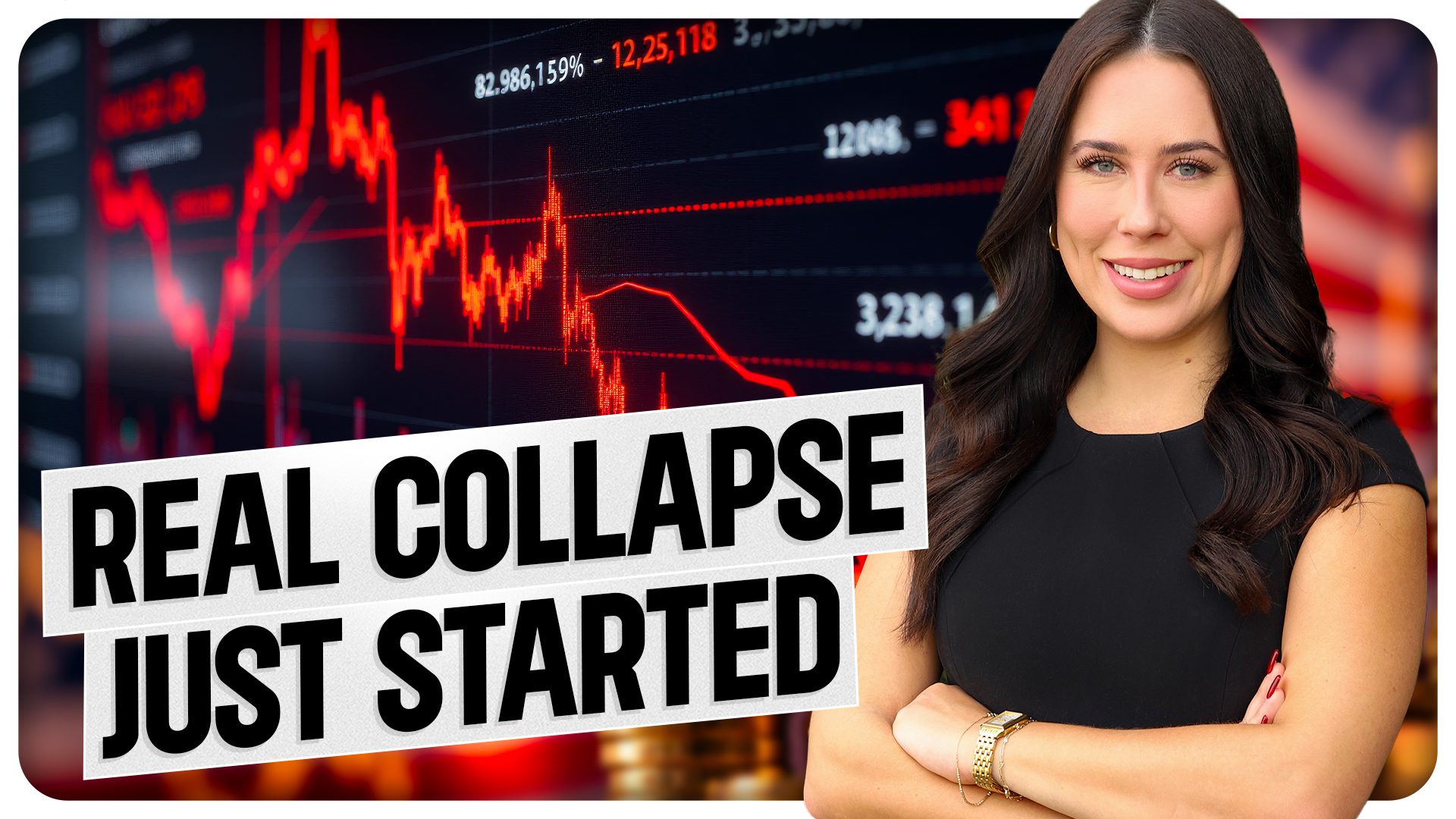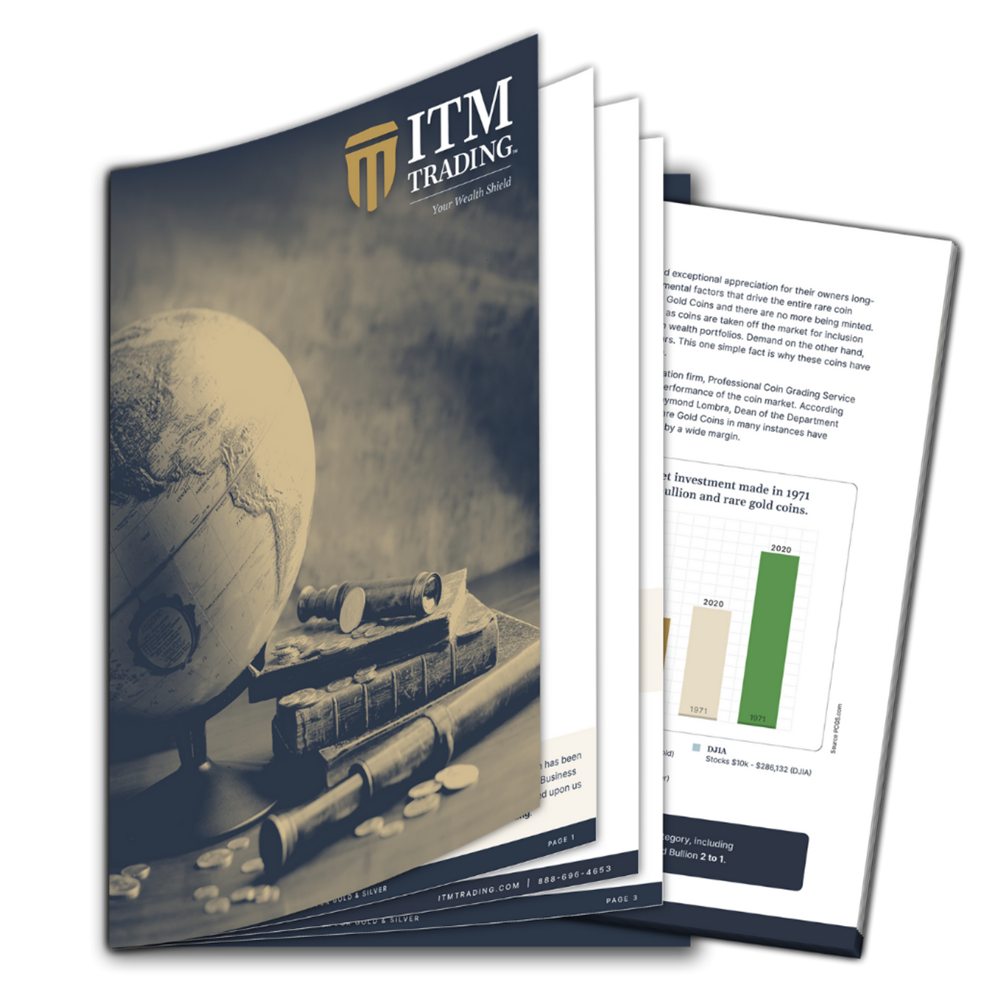A “Gigantic Systemic” Meltdown, Greater than 1930s Depression is Coming Warns Market Insider
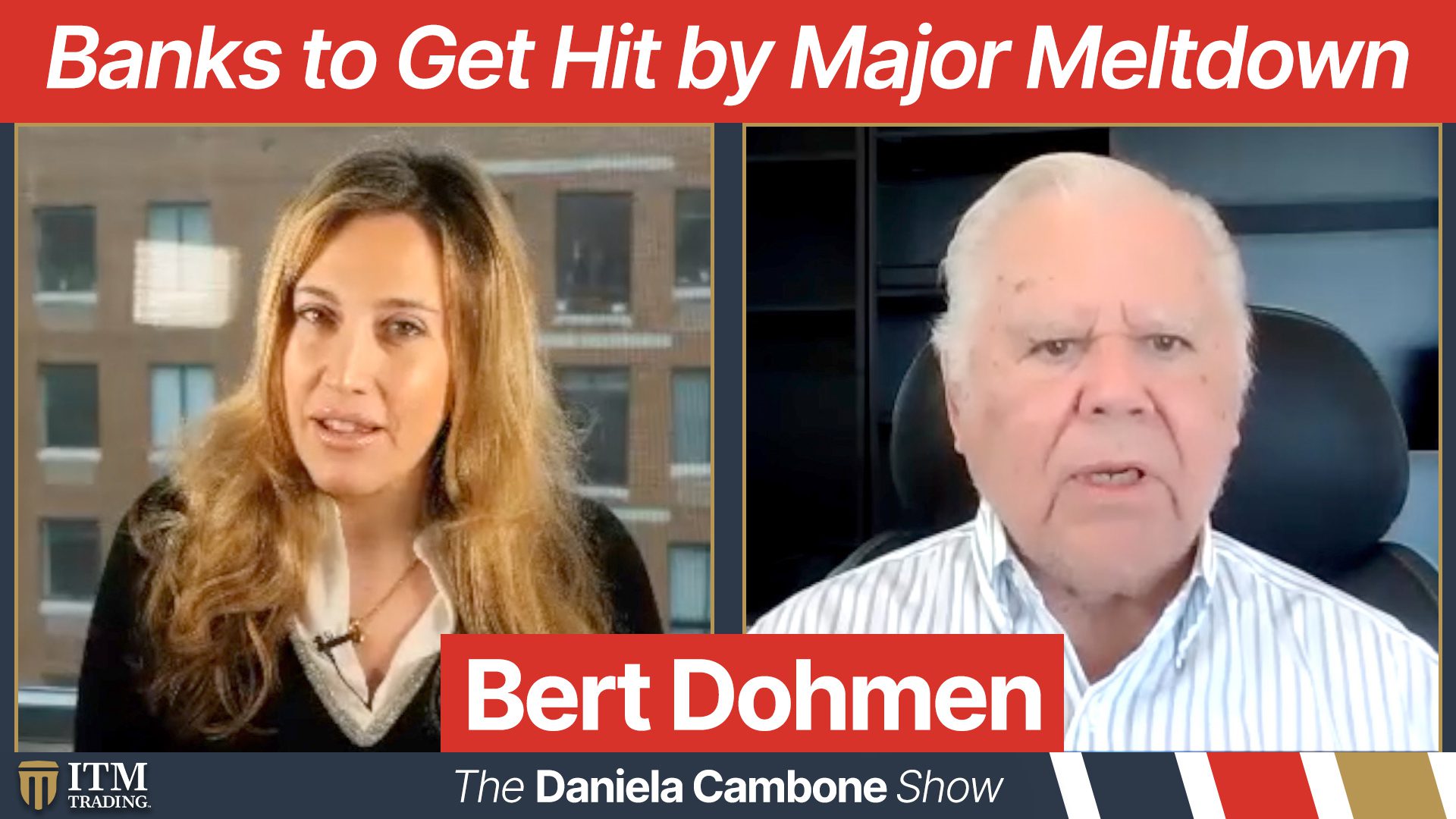
Daniela Cambone interviews Bert Dohmen, founder and president of Dohmen Capital Research, discussing the banking sector, China, the Fed, and the importance of having a Plan B in their recent conversation. Dohmen warns that the failure with regional banks last year was not a “one-off” situation, and he emphasizes that a “gigantic systemic meltdown” is underway and would be hard to halt. He also expresses that we are currently in an era worse than the 1930s, marked by wars, riots, droughts, food shortages, and market crashes. Dohmen further advises people to email their Congress representatives to oppose detrimental legislation. Watch the video to delve deeper into his insights and learn how you can be prepared for the unfolding uncertainties.
CHAPTERS:
0:00 China Crises
4:46 Regional Banks
11:31 Interest Rates
15:57 Gold
18:56 Deflation or Inflation
21:11 “Writing on the Wall”
27:36 Wealth Protection
TRANSCRIPT FROM VIDEO:
00:04
This is Daniela Cambone. Welcome back to the Daniela Cambone show here on ITM Trading. Well, my next guest is often known for his contrarian, but accurate forecast on the markets, the economy, and the Federal Reserve policy. In fact, he has been called a leading Fed watcher by the Wall Street Journal. Please welcome to the show, Burt Dohmen. He’s the founder of Dohmen Capital Research and also of the very well-respected Wellington Letter.
00:30
Bert, it’s been too long. So good to be reunited with you. Welcome. Welcome to the Daniela Cambone Show here. Yeah. Good to see your pleasant face again. Well, we have a lot of ground to cover today. I’ve been following the Wellington letter with great interest, even though most of the stuff I’m reading is really getting my mind going, thinking, am I prepared enough for everything that you’re talking about?
00:57
So let’s start with your recent edition that was mostly focused on what you see happening in China and what you say that China will lead the global markets into the abyss with what you’re seeing happening there. It’s funny because just this morning I saw a news headline from a former P-BOK advisor insider saying, oh.
01:22
everything you’re reading on China, it’s really not so bad. Obviously it’s a Peabock insider saying this, but I wanna get your take on what you feel is happening in China and how you think it’s gonna spill over to the rest of the world here. Yes, I’ve been saying for, I think about the last two years, the next big financial debacle in the world will be led by China. China used to be the locomotive of the global economies, okay, and it really was.
01:49
you know, the low wages over there, the high productivity, over a billion very intelligent people, hardworking people and so on. And you know, I was so impressed the first time I went to China, but all the young people, you know, first of all, of course, you get the chamber of commerce speech and everything is so wonderful and that you find from the young people, boy, I wish we could do this, I wish we could do this and so on, but they’re stopped all along the way by the government.
02:18
And I said to whatever I said, I came back. We are just lucky that they have communism over there because if they would ever adopt capitalism the way we have it in freedom and all these young people would be able to do what they want to do, they would run all over the West. Well, how much of what you’re basing this thesis on has to do with the latest debacle that we saw with Evergrande? I mean, was that really the highlight of highlights of investor despair?
02:48
This morning, we saw Azora Bank as a big portfolio of US real estate. They had the rule off much the bigger properties in the US, more than by 50%. That’s a big write down, 50, 55% of their real estate holdings. And there’s one comment from an analyst that even says that many of these loans, when they come to maturity, which is gonna be the next year or two,
03:17
they don’t have the money to pay the loans off. So this is the big debacle. Over the next year and a half or so, we’re gonna see about $2 trillion worth of commercial real estate loans coming due. Okay, so the only thing that banks can do is then extend the terms. You know, they say, okay, let’s extend it for a few years so that they don’t have to count it as a default. Banks don’t like defaults, okay? Because that’s really bad for the balance sheet.
03:47
So we’re gonna see a lot of these extensions, but the banks themselves have big problems. Yesterday we saw Community Bank of New York, again, start tumbling, it had to be rescued. One year ago in March, it was rescued by several other banks. Now they want their money back that they put into the bank, okay? So what happened to that stock yesterday? Down 38% in one day. Today,
04:15
all the regional bank stocks were tumbling five, six, seven percent. So this is what happens. These are not isolated incidents. And nobody on on financial TV mentions it. They say, oh, this is one off, you know? No, this is systemic. We are seeing a gigantic systemic meltdown starting, starting. And once it gets rolling, it’s going to be really, really,
04:45
It’s hard to stop. I think part of the issue, Bert, is the disconnect, right? And the news that we’re hearing. So people, you know, maybe watching this will say, okay, that’s happening in China, but they can’t see how that’s going to domino effect into the U.S. when they’re reading headlines of consumer confidence is robust. Inflation is coming down. The U.S. economy is, you know, the strongest on the block. So, so I think-
05:13
You know, Daniel, it was so important in China, analysts, you know, we’ve been looking at China, foreign deposit outflows, it was actually called FDI, foreign deposit inflows, but now they’re actually seeing for the first time outflows of this huge foreign money. You know, the money is leaving China, foreign money is leaving China. That is terrible.
05:39
They are now seeing money leave so fast. There was even a rumor that Xi Jinping was in San Francisco meeting with our president. He was hinting at getting a loan from the US of $900 billion. So their money is being depleted very fast. There was one news article that I read a couple of weeks ago that the money going from China into Singapore over the last few months is $1.2 trillion.
06:09
trillion. Can you imagine this money going to Singapore for safety? And I want to get back to your point about the banking crisis in the US. And this is so important because I feel that, you know, we all stopped talking about it. And there was this feeling of, okay, we’re out of the woods. But to your point about Community Bank, which was the rescuer last, last time around, is now in turmoil. And here’s this, this
06:36
report that says, while regional banks started off the new year strong, the top six reported 15% to 38% drops in their profits year over year from 2022 to 2023. So let’s talk about how big of a crisis this could be. Well, I think, you know, the problem last March when we had what, three or four banks failed in a set of a month. And that was the biggest ever in history, even
07:07
And so people think the crisis is over just because a few banks failed and another one, couple of others I think have to be bailed out. No, that’s not true. The losses are still sitting there in their bond portfolios. They made a very bad bet, which is the same bet, the false bets that the US investors made in the bond market. You know, we were shorting the bond market about two and a half years ago, three years ago.
07:35
shorting the bottom line. They said, this is a no brainer. You got to sell the bonds short. They’re going to go down 40 to 60%. Right. And they went down, what was it? 48% so far. It’s not the end yet, but… Sorry. Yeah, no, but so they’re still sitting on these losses, unrealized losses, you know? And that is the big problem. So how are they going to make up for these unrealized losses?
08:02
all these bonds that they are sitting on in their portfolios are underwater. They bought them in yields with a low 3%. So when the 3% goes up to 6% yield, then suddenly the bond goes down probably 35, 40, 45%. That’s huge. In 1978, for example.
08:29
when the Federal Reserve said, we’re not going to use tight money to fight inflation, we’re going to do it with interest rate policy, which meant raising interest rates. And my business was about one year old at the time. And I said, that means inflation full speed ahead, you have to sell bonds short, T-bonds. So we sold T-bonds short and we bought the, we shorted the zeros actually, which had their coupon clipped off.
08:58
And so in effect, you get leverage. And over the next 30 years, they went up 40 fold in price, 40 fold. Yeah, so it was a huge profit. But what happened with these bonds is when inflation rises, the bond yields go up, which means bond prices go down. It’s just, it’s mathematical. It has nothing to do with market forces, it’s just mathematics. But who learns mathematics anymore?
09:27
You certainly don’t in school. Let me ask you. So let’s say crisis hits the regional banks yet again. Will the Fed just come in again and do that backdoor QE that we saw? I mean, how many times can they get rescued here? That is when we start talking about much higher inflation, although the economy may not be strong. Now, in fact, yesterday, when I heard the chairman of the Fed talking about
09:54
The economy is strong. The labor market is very strong. That’s all a bunch of bologna. These are false numbers that they’re using. These are all numbers that come from our Bureau of Labor Statistics, BLS. We call it Bureau of Lying Statistics because they lie with those numbers. They’re all phony. They use seasonal adjustments to turn a big, big negative number into a positive number.
10:22
In January of last year, for example, they reported 514,000 new jobs created. And so we went to the BLS website and here it had the real number. Two and a half million jobs were lost that month. So how do you turn 514 gained into a two and a half million dollar loss in jobs? These are numbers that are not realistic. Therefore the GDP number is also totally wrong.
10:51
They talk about a strong GDP. It’s not strong because the GDP includes U.S. debt financing, deficit. They are included in GDP. So if our deficit financing doubles and so on, boy, our GDP is gonna be 10%. You can’t, I mean, these numbers are false and nobody on TV, none of these analysts take the trouble to analyze and see, okay, let’s verify these numbers.
11:20
I mean, verification is so important. I always had advice that two investors verify, don’t just believe what you will hear on TV, verify the number yourself. Let me ask you this because you are known as one of the best Fed interpreters. So let’s talk about that shift in language. We heard from the Fed where they kind of put the brakes.
11:45
on the talk of cutting interest rates. Now they’re saying one in March is now unlikely. There was a change in narrative, Bert. So what do you think’s going on at the Fed here? Well, assuming that they know what they’re doing, which is a risky assumption, okay? Because I don’t remember one Fed chairman who was correct in any of his forecasts. Now that doesn’t mean that
12:14
for himself, he didn’t know what was really going on. So that’s always the question. I write that in every issue of our Wellington letter, say, you know, we don’t know if this is, this false information is intentional or if they’re just dumb. You know, we really don’t know. I still don’t know. I would like to know. Would be interesting to see if they really believe it. Maybe they do believe it, you know, because I remember in college,
12:41
My degree was in chemistry. So I said chemistry and physics was my minor. But I took two years of economics just to see why economists are always so wrong. And I found out they didn’t know what the heck they were talking about. For a second year, advanced economics, they use calculus, higher mathematics, and the professor didn’t know it. So whenever it came to the math, to explain that he asked me to
13:09
come up from a class that I explained it. It’s like a meteorologist, Bert, right? Yeah. Okay, so- I took that course too, in meteorology, because I learned how to fly. Let me ask you, what do you think they want to see before they start cutting rates? What they want to see? Yeah. Does anybody know? I wish somebody would tell me. Are they looking for a strong economy? I mean, he was so bullying yesterday. Oh, the economy is so strong, like-
13:36
he had accomplished a strong economy. And then another time we got a bad economic number and then the stock market goes up because now the old Fed is gonna cut rates. So what is it? Do we want a strong economy? Do we want a weak economy? I don’t know. And on top of this Bert, it’s an election year. So how do you think? Exactly, oh, you got it right there. So let’s talk about how that’s just the cherry on top of everything. Yeah. I think
14:04
That’s an excellent point because traditionally in an election year, the stock market goes up because the president wants to get reelected. Now, this time around, he’s going to really need a booming economy, maybe 10, 20% GDP growth and 20% inflation that they’re going to hide with their seasonal adjustments because
14:33
They never tell you the true inflation. You know, here when inflation was at the high, about a year and a half ago, the official number was 9%, I think that was the high for inflation. The actual number calculated as it was in 1980, it’s calculated done by Dr. John Williams of shadow stats. And he figured it was 16.1% inflation. That was the actual inflation. So they, but…
15:01
The Bureau of Labor Statistics cranks it down to an acceptable 9% at that time. Yeah. So, so now, and the other question is, what, what will it be? What will inflation be? That’s why these long-term forecasts right now, uh, for exact numbers, they’re useless. Look at what they were just forecasting. Just a week ago, they were forecasting big, uh, interest rate cut by the Fed on March and six more, six cuts.
15:30
totally this year by the Fed. Okay, so suddenly we hear one speech of Powell, the head of the Federal Reserve, and suddenly they reduced that to three, oh, three cuts, oh, maybe not even that, you know? So you see how long-term forecasts change, how quickly? That’s why, you know, people should not look at these numbers as absolutes. These are all guesses. That’s set, Bert. I’d love to know…
16:00
assets, things you’re liking. I mean, were you surprised to see gold rallying post the Fed despite the cut, the no cut announcement? Yeah, I think gold, you know, gold is always hyped. Okay, because there’s so many outfits selling gold. Okay. And so you’re always gonna hear these ads and, but.
16:25
I think this time looking at a purely technical question, that’s what we do, advanced technical analysis. That only, that will, technical analysis tells you changes in supply and demand. That’s all the, forget all the other metrics like dividends and earnings, earnings, oh my God, earnings are so overdone. You know, one time the earnings of the stock go up and the stock goes down, then the earnings go down, the stock goes up. These are all valueless.
16:54
What you want to know is what the big money is doing. Okay? And the big money, you find that out by combining the price change with the volume change. We’re firm believers in looking at volume. For example, here in January, the market was up, everybody was getting so excited and so on. Look at volume, volume stinks. There is no volume. Look at the IPO that they tried to do today. Immediately went down.
17:24
You know, there’s no demand. So the only demand that we have now is high frequency trading, HFT. Over 80% of the trading volume on many days is HFT. These guys with their fast, super fast computers can enter 90,000 trades per second. Trades, not shares, trades, 90,000. Can you compete with that? These guys sitting in front of their laptops, do you think they can trade?
17:54
90,000 trades per second with their little laptops. No, this is all a game right now. How can we make the money the fastest? These HFTs, they’re not in it for buy now and we’ll sell next year. No, they say buy now and we’ll sell two hours later. That’s what it is. I know, I played tennis with someone who started the first HFT firm ever and finally sold it to a very large bank in New York.
18:22
very nice price. And so he told me about, they go for pennies per share profit, pennies. So how could, but that changes the market equation. So, but the average person doesn’t realize this 80% of the volume is these algo traders, HFT. So that said, I’m assuming you’re not in US equities. Well,
18:51
We like to be, especially in downturn, we like to be in short US equities. Talk to me, do you like commodities right now? The commodities, yes, if inflation rises, but right now we’re really under cusp of whether it’s gonna be deflation or inflation. And that all depends on what the Fed does. The Fed creates the inflation, okay? Now.
19:17
We can estimate that, of course. We don’t know what they’re gonna do because they don’t know what they’re gonna do. But all we can see is the huge amount of money that has to be raised by the US Treasury to finance the deficit, $34 trillion worth of debt. They have to finance the interest payments on that. They have to finance the continuing new deficits, okay? So that means that the Federal Reserve
19:47
have to come in as a buyer of last resort. We’re seeing the last auction of five year treasury bonds was terrible, was terrible. There was no demand. The two year had very good demand. So that means that the big money is now going to the very short, short end, you know? We’ve been recommended recommending a 90 day T-bills in the form of an ETF for over the last two years. It’s that that’s the best investment. 500 and a quarter percent interest.
20:16
free of local taxes. Are you long US dollar? No, we’re not. We don’t have a position in US dollar. US dollar, see, this is again, another hoax. Everybody’s so old, the dollar is gonna go to zero, dollar is gonna lose all of its value because of these deficits and all the crazy stuff in Washington. No, the dollar’s value is not a value. It is a comparative value to other currencies.
20:44
but the other countries are doing the same thing. So you don’t know, is Germany now gonna be inflating more than the US or France or whoever? It’s a comparative. So this is very difficult to take a position in one currency and not another. China right now is still, it has been a good short under currency, but that will change once they really step on the accelerator.
21:09
Speaking of Plan Bs, let’s wrap with this because we were really having a good conversation and I think it’s one that we should share with the audience of how kind of before the start of the pandemic, you kind of saw the writing on the wall and you went to your Plan B, you moved from California to Hawaii. And we were speaking about the importance of having a Plan B. So I’d love if you could just share some of that with our audience here.
21:38
Yeah, I think, you know, this is such an unusual time. You know, at the beginning of 2020, you know, it’s traditional that everyone in our business gives a forecast for the decade, which of course is not easy to do, you know? But I said, the best thing I can say, just read about the 1930s Great Depression, 10 years depression, okay? But it wasn’t depression for 30 years.
22:06
It’s a stock market. Yes, the stock market hit the skids, went down 80 some percent to the low, but then they had a 50% rally in the Dow. So you could make money even on the long side during that time. Nothing goes in a straight line forever. Everything goes in cycles. But so I said, it’s gonna be like the 1930s. So that means we’re gonna have wars, we’re gonna have hostilities, we’re gonna have riots in the streets, burning cities, we’re gonna have droughts.
22:35
We’re going to have food shortages in some areas of the world, et cetera. So I outlined all these things and market crashes. And so it’s all has come to, came all true in first three years to last. One of those items that to come true was wars. We didn’t have a war and then Ukraine started. Okay, then we had our war. And now we’re gonna have more wars because our war machine needs the money.
23:03
we’re facing a period worse than the 1930s then. I think so. You also wrote in a former letter that the federal government is running its largest deficit as a percentage of GDP outside of World War II. You say another great achievement. Yeah, but you know, that as a person, the debt as a percent of GDP, it’s not really that important. You know, they make too much of it.
23:33
because the government can print, print, print, print. I mean, they used to be printing, but now it’s cyber money. They just make a few entries in a computer and suddenly they got another trillion dollars. You know, it’s, I remember in the late 1970s, Congressman Ron Paul, he took a small group of us in my business through the, through Washington, D.C. And one of the visits was
24:00
the printing press, the Bureau of Inquiry, where they print the money. The guy at that office, he said, we just got all new printing presses, the fastest printing presses in the world. Heidelberg presses from Germany. We all have to laugh. Because we all knew about the German hyperinflation. Oh, let’s just, just one more point on having like a Plan B or Plan C in terms of everything we need to face.
24:29
For those listening at home saying, okay, that’s great, but I can’t have maybe another home outside of the US or whatnot. What can we do, like simple things we can go do in the day to day to plan for what’s coming? Well, I think one thing is that we should all take in after if you don’t like what’s happening in the country right now, write emails. Ran Paul.
24:57
He got everyone in our industry years ago to write letters. That was before the internet, before emails. And he said, here’s a bad bill going through Congress. We have to fight it and so on. And all the publishers of newsletters then alerted their subscribers and urged them to write a letter to Washington. And he got thousands of letters written to Congress people.
25:22
And he said, it was so effective in stopping some of the bad legislation. Now we can do it so much easier. Just go to the website of emails for US members of Congress and you can get the email addresses of all your representatives. Send them an email of what you really want them to do. You know, if you don’t like that, you know, here, what is it now? Ten million people, many of them criminals and terrorists coming across our border. Then.
25:51
Do something about it. Get those people to get off their butts in Washington and do something for the money that we pay them. This is horrible what’s passing, what’s happening. Bird, I think that’s a really wise words. I think a lot of times we think, oh, what difference could an email or a letter make? But I think you raise a really important point that- We have to get involved. We have to unite if we can make a difference. Yeah, Daniel, look what they’re doing in Europe now.
26:18
thousands of tractors on the freeways, blocking traffic and so on, just to call attention to the fact that Germany now, it was in Netherlands before, they’re trying to drive the farmers out of business. It seems like there’s an agenda on the way to stop food production. We should all go and eat bugs. And I don’t know about you, but I have a friend, she’s very radical, and she was offering
26:47
Bugs one time to her guests at her house, you know, I didn’t have training ourselves Yeah, but but the bugs have a lot of parasites inside of you know, they’re finding this out now You don’t want to eat not even one of them, you know So but this is what’s happening look at all the chicken farms millions of chickens going up in fire, you know This is this never happened before chicken farms around the country. I think one was a two days ago. Yeah burned up It was incredible. So
27:16
Why are they trying to stop food production? I don’t know. It was in Texas, Texas chicken farm in Gulf for hours in a massive blaze just this week. So I don’t know what’s behind all this Bert, but we’ll keep digging. Yeah, but in the meantime, be safe, forget all this garbage that they try to sell you on Wall Street, like the NFTs, you know, those are worthless things.
27:46
You know, and but people buy and say, well, but look at all the money you can make Bitcoin. My God, I’ve had discussions with people about Bitcoin and all the cryptos. You know, we’ve got over three thousand trip cryptos out there, but 80 percent of them have gone bankrupt down where people lost everything. And you won’t touch Bitcoin, right? You don’t touch Bitcoin. Show me where the intrinsic value is. If you can’t even you have a Bitcoin that, let’s say, has a market value of forty thousand dollars.
28:16
You can’t even go to a bar at a crypto conference in Miami and get a beer for it. The $40,000 Bitcoin, you can’t even buy a beer for it. So if you can’t buy a beer for it, it’s not worth anything. All right, Bert Dohmen, it’s always a pleasure catching up with you. You can read more from Bert with his Wellington letter. I hope to see you in person.
28:44
Very soon. It would be great. It would be great. Okay. Thank you. You don’t have to twist my arm to come to Hawaii. So, okay. All right. I’ll just set you an invitation. How’s that? There you go. Thank you, Bert. And thank you all for watching. We’ll have more great content coming your way. So be sure to stay tuned to the Daniela Cambone show and don’t forget to sign up to stay on top of it all at danielacambone.com. That’s it for me. We’ll see you soon on ITM Trading. And I wish all your listeners the best in the markets and the health.
29:14
Health is more important than money. Absolutely, amen to that. All right, take care. Thank you. Bye.
SOURCES:
https://twitter.com/TheLynetteZang
https://www.youtube.com/@ChinaObserver0/videos
https://www.youtube.com/watch?v=GEAebvJsqM4
https://www.youtube.com/watch?v=h4MN0t5Hyo8&t=193s
https://finance.yahoo.com/news/consumer-confidence-remain-robust-2024-145500024.html
https://www.cnn.com/2023/12/12/economy/cpi-consumer-price-index-inflation-november/index.html
https://www.youtube.com/watch?v=nrBDk6buT3E
https://www.youtube.com/watch?v=EQO4AFabpmA
https://www.nasdaq.com/articles/worrying-signs-from-regional-bank-earnings
https://www.youtube.com/watch?v=M7nj2X-yl_U
https://www.cnn.com/2024/02/01/economy/january-jobs-report-preview/index.html
https://www.youtube.com/watch?v=y-4YphyjiQQ
https://www.youtube.com/watch?v=ETU0ecHCecg
https://www.youtube.com/watch?v=OydE_1J8pWo
https://www.bls.gov/news.release/archives/empsit_02032023.htm
https://www.cnbc.com/2023/02/03/jobs-report-january-2023-.html

